Oklahoma Civil War Map of Battles
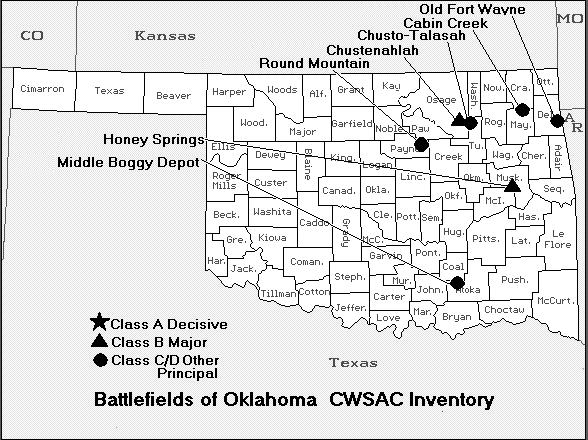 |
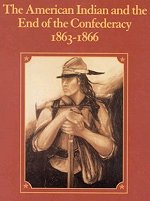 The American Indian and the End of the Confederacy, 1863-1866 The vulnerability of the Indians caught between two warring sides. The failure of the US government to afford to the southern Indians the protection solemnly guaranteed by treaty stipulations was the great cause of their entering into an alliance with The Confederacy |
DVD 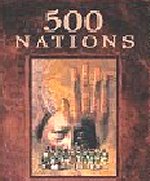 500 Nations An eight-part documentary that explores the history of the indigenous peoples of North and Central America, from pre-Colombian times through the period of European contact and colonization, to the end of the 19th century and the subjugation of the Plains Indians of North America |
Civil War State Battle Maps American Civil War Exhibits American Civil War Timeline Civil War Recipes Ships and Naval Battles Confederate Commanders Women in the War Civil War Summary Civil War Picture Album Reenactors Row Supplies |
DVD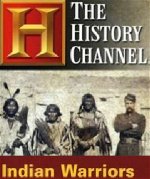 Indian Warriors - The Untold Story of the Civil War Some 20-30 thousand Native Americans fought in the Civil War. Ely Parker was a Seneca leader who found himself in the thick of battle at the side of General Ulysses S. Grant. Stand Waite, a Confederate General and a Cherokee was known for his brilliant guerilla tactics |
Kindle Available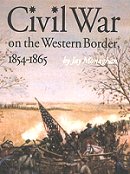 Civil War on the Western Border, 1854-1865 Fanatical politics of the western frontier, immigrant abolitionists with loaded Spencer rifles funded by mysterious personages back East, cut-throats, gin heads and horse thieves, colorful character descriptions |
 The Civil War in Arizona: The Story of the California Volunteers, 1861-1865 History of the California Column in wartime Arizona and a rare compilation of letters written by the volunteer soldiers who served in the U.S. Army from 1861 to 1866. These letters provide testimony of the grueling desert conditions the soldiers endured as they fought on many fronts |
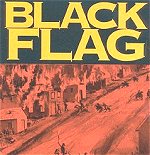 Black Flag: Guerrilla Warfare on the Western Border, 1861-1865: A Riveting Account of a Bloody Chapter in Civil War History The guerilla warfare along the Kansas-Missouri boarder brought forth some of the bloodiest incidents of the Civil War |
Kindle Available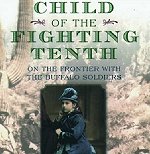 Child of the Fighting Tenth: On the Frontier with the Buffalo Soldiers The drama of growing up in the frontier army, the Indian wars on the plains, the Geronimo campaign in the Southwest and Mexico, her love for the regiment and the Buffalo Soldiers, their admiration for her, and even her lost love for a dashing young cavalry officer |
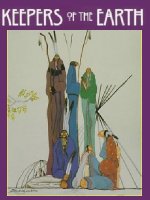 Keepers of the Earth: Native American Stories and Environmental Activities for Children These are stories from the various First Nations. They are well told. Get this for your kids. In an age of instant media, the storyteller's art is one that is timeless, connecting us to our oral past. Make sure that it connects to our future, too. |
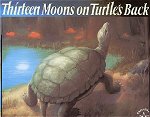 Thirteen Moons on Turtle's Back The Turtle's shell stand for the 13 cycles of the moon, each with its own name and a story that relates to the changing seasons. Joseph Bruchac and Jonathan London collaborate to reveal the beauty of the natural world around us, while Thomas Locker's illustrations honor both Native American legends and the varied American landscape |
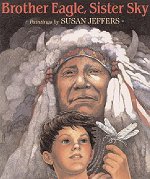 Brother Eagle Sister Sky The Earth does not belong to us. We belong to the Earth. The great American Indian Chief Seattle spoke these words over a hundred years ago. His remarkably relevant message of respect for the Earth and every creature on it has endured the test of time and is imbued with passion born of love of the land and the environment |
 The Talking Earth Billie Wind lives with her Seminole tribe. She follows their customs, but the dangers of pollution and nuclear war she's learned about in school seem much more real to her. How can she believe the Seminole legends about talking animals and earth spirits? |
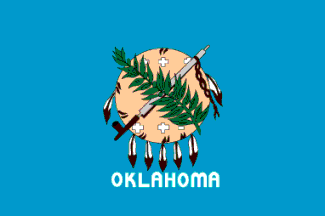 |
The present Oklahoma State Flag adopted by the State Legislature in 1925, is Oklahoma's 14th flag. This shows a sky blue field with a central device: an Indian war shield of tan buckskin showing small crosses on the face -- the Indian design for stars -- and seven eagle feathers pendent for the edge of the shield. An Indian peace pipe (calumet) with a pipestone bowl and a tassel at the end of the pipestem lies on the shield; above the Indian peace pipe is an olive branch, the white man's emblem of peace. Underneath the shield or design in white letters is the word "Oklahoma." |
|
Books Civil War Womens Subjects Young Readers Military History DVDs Confederate Store Civil War Games Music CDs Reenactors |
Sources:
U.S. National Park Service
U.S. Library of Congress.